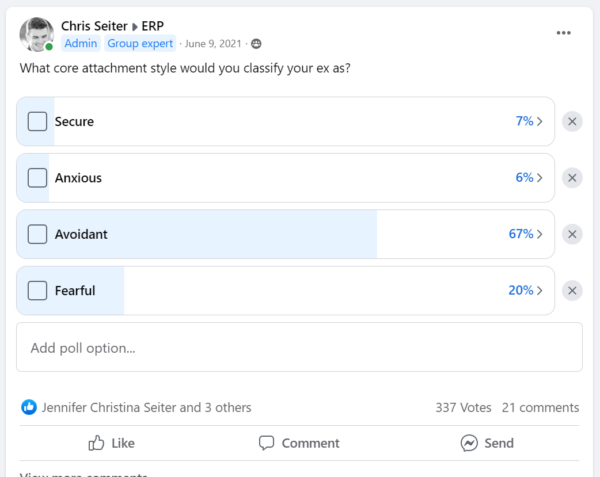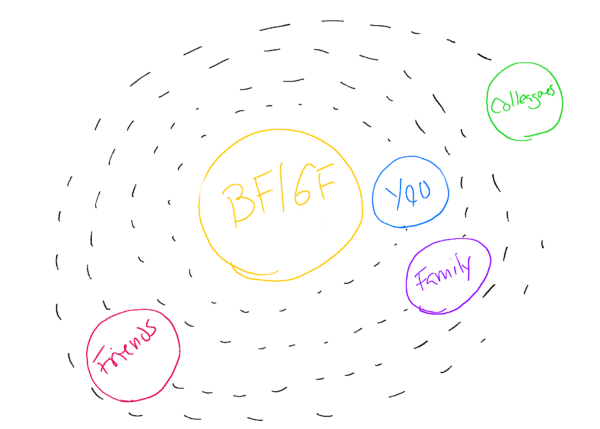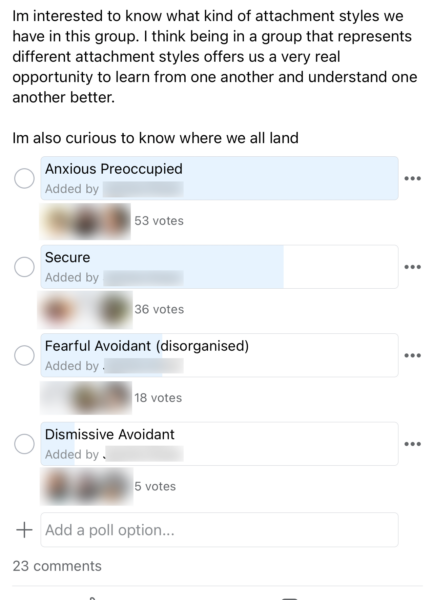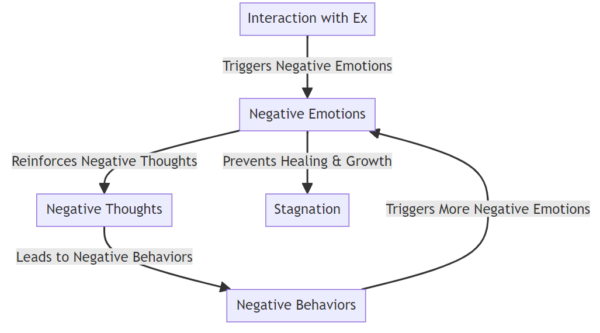I have very strong feelings on why I think it’s important that you NOT talk to an ex after a breakup.
I’ve written 20,000 word guides, filmed videos, done podcast episodes on the very topic. In all though, each of those guides, videos and podcast episodes revolve around the same five arguments.
- Some form of no contact has been present in every single on of our success stories
- It’ll help lower your elevated cortisol
- Not taking a break from your ex prevents you from healing
- The anxious attachment concept
- It’ll help you break out of a negative feedback loop
Let’s dive in a bit deeper!

What Are Your Chances of Getting Your Ex Boyfriend Back?
Take the quiz1) Some Form Of No Contact Has Been Present In Every Single One Of Our Success Stories
Over the last 10 years, I’ve had the privilege of talking to and interacting with individuals who have used our program to successfully get their exes back or move on from their exes.
Hundreds of individuals, and out of those hundreds, I’ve had the pleasure of sitting down and interviewing 57 of them. You can check out those interviews in the success story section of our website, or you can simply listen to them on the podcast; they’re interspersed there.
Here’s one of my favorites,
What’s always really interesting to me when I interview someone who has successfully gotten their ex back is that I always try to take it as a learning experience. I set my ego aside and try to understand how they viewed the world and what worked for them.
So, before I interview success stories, I always tell them,
“Hey, I don’t want you to feel any pressure if you didn’t follow the way I suggested. What I’m interested in is what you did that worked. So, if you made adjustments along the way, or if you completely disregarded the program and did your own thing, I want to hear that because it will help me improve.”
I’ve gleaned many interesting insights. It was only through success stories that I learned how fearful-avoidant attachment styles need to be treated differently than avoidant attachment styles from a no-contact perspective.
But one of the most significant lessons I learned is the consistent presence of the no-contact rule in every success story. Some form of a no-contact rule was implemented. This underscores the importance of not talking to your ex in the aftermath of a breakup.
However, I think many people often misinterpret this. It could be that the reason the people I interview, who have either gotten back with their exes or moved on, used the no-contact rule is that they learned about it through my website, podcast, or YouTube channel. It might seem like a chicken-and-egg situation: they did what they were taught, so they’re obviously going to follow that.
But I genuinely don’t believe that’s the case. believe the no-contact rule is an inherent concept.
The mistake people often make regarding the no-contact rule is overemphasizing the psychological reactance aspect.
As you know, one of the reasons the no-contact rule is so effective is because it can leverage this concept called psychological reactance. This concept essentially posits that human beings have behavioral freedoms, and when those freedoms are taken away, they are much more likely to react in an attempt to reclaim that freedom.
So, by ignoring your ex, you’re depriving them of the freedom to converse with you, making them more inclined to reach out. Often, people perceive the no-contact rule primarily as a strategy to make an ex miss them.
However, what I discerned from interviewing these 57 individuals is a recurring theme. While some did use the no-contact rule with the intent of making their exes miss them, most did not.
Perhaps that was the initial intention, but along the way, their focus shifted more towards personal growth and moving beyond their ex. They began to let go of the idea of getting their ex back, and that’s when they started seeing results.
I believe that’s the key takeaway.
2) Help Lower The Elevated Cortisol
One of the most basic neurochemistry lessons about what happens during a breakup is that your cortisol becomes extremely elevated.
Refer to this graphic below for help visualizing,

What Are Your Chances of Getting Your Ex Boyfriend Back?
Take the quiz
Cortisol is also known as the stress hormone, and it’s particularly relevant for several reasons.
I found a comprehensive research paper, which you might not delve into, so I’ll summarize it for you.
It argues that prolonged or exaggerated stress responses can lead to cortisol dysfunction, widespread inflammation, and pain. While stress might be an inevitable part of life and challenges are inherent to success, humans can modify what they perceive as stressful and how they respond to it.
Essentially, the paper suggests that the more stress you experience, the higher your cortisol levels rise.
My contention is that during a breakup, your cortisol levels spike.
(Once again, look at the graphic above for help visualizing.)
If you keep interacting with your ex and feel stressed from these interactions or even from seeing them on social media, it triggers more cortisol production. This increased cortisol makes you feel more stressed, maintaining you in a heightened stress state.
Another piece of information I came across was an article from Mind, Body, and Soul from Australia.
A doctor named Dr. Lee discussed cortisol and mentioned that it could take three to four hours for cortisol levels to normalize after a stress response, like an argument or a high-stakes meeting. However, if your levels have been elevated for an extended period, it might take up to six months to balance them.
Post-breakup, your cortisol levels surge. But if you remain in contact with your ex, these levels stay elevated. Ideally, it should take three or four days for them to decrease, but they don’t get the chance to. Your body then adapts to this high cortisol state, leaving you in a stressed state for up to six months.
Therefore, my argument is that one significant reason to avoid talking to your ex immediately after a breakup is to help lower your cortisol levels.
By refraining from talking to them and avoiding stressful situations, you can effectively reduce your cortisol.
3) Not Taking A Break From An Ex Prevents You From Healing
I’ve been doing this for a long time. One of the things I’ve observed about my clients is that they come to me, desperately hoping I’ll provide some magical solution to help them get their exes back.
Most leave disappointed when I explain that there’s no magic solution to getting your ex back. In fact, the wisest thing you can do to help get your ex back is to move on from them.
This aligns with the avoidant concept, where we’ve found that most of the exes our clients aim to reconcile with are dismissive avoidants.

A dismissive avoidant typically doesn’t miss you until they believe you’ve completely moved on. I’ve created entire YouTube videos discussing this factor and its significance.
I’ve witnessed its effectiveness in real-time cases. You can refer to the interviews I mentioned earlier, where I spoke with success stories who’ve reconciled with their exes and observed this pattern.
Another aspect that isn’t frequently addressed is the codependence element.
We’ve noticed that many of our clients are highly codependent on their exes. Their entire world revolves around their ex and the idea of getting them back.

They can’t fathom a life without their ex, and if reconciliation doesn’t happen, they struggle immensely. A significant portion of my coaching involves helping individuals break free from this skewed perception, guiding them towards less codependency and fostering a more interdependent relationship dynamic.
If you’re continuously in contact with your ex, it hinders your healing process.

What Are Your Chances of Getting Your Ex Boyfriend Back?
Take the quizRevisiting the cortisol concept, when cortisol levels are high, engaging in stress-inducing activities or those that cause distress makes you more attached to the activity or, oddly enough, the associated pain.
My argument is that by implementing this self-imposed break, you grant yourself the chance to extricate from this codependent snare. It allows you to shift your perspective, so you no longer view your ex as the epicenter of your universe. Instead, you become the focal point, and your ex becomes just one of the entities gravitating around you.
It’s an unconventional analogy, but let’s continue with this mindset as we transition to factor number four.
4) Anxious Attachment Concept
Earlier, I mentioned that most of our clients’ exes tend to exhibit avoidant attachment styles.
Conversely, many of our clients display anxious attachment styles.

And do you know what often accompanies an anxious attachment style? Codependency.
Now, having an anxious attachment style isn’t the worst trait. Essentially, it signifies that you possess a deep-seated fear of abandonment. Any event or thought that triggers this fear can lead you to act, not necessarily irrationally, but erratically, as you scramble to address a situation that doesn’t align with your desired timeline.
In my observation, anxious individuals are often exceptional problem solvers. Their heightened cortisol levels drive them to seek solutions, as resolving the issue is the only way they perceive to restore their cortisol balance.
However, with breakups, immediate solutions are elusive. So, I advise my anxious clients to utilize the no-contact rule as a period of respite. Instead of fixating on their ex, they should channel that energy into something they can be equally passionate about. Much of the challenge in overcoming a breakup and moving past an ex revolves around battling obsession.
The constant urge to check their social media, the nagging curiosity about their dating life—each act amplifies the anxious tendencies. My recommendation is to acknowledge that this obsession will persist for a while.
However, the energy and effort that would typically be directed towards winning back an ex should be redirected towards discovering another passion that holds equal significance. This shift is pivotal in breaking free from a codependent relationship or mindset.
The goal is to find a purpose greater than your ex, a purpose that, once internalized, empowers you to take control of your destiny.
By addressing stress in a constructive manner, rather than succumbing to obsession, you not only foster personal growth but also present yourself in a light that might make your ex perceive you differently.
5) It’ll Help You Break Out Of The Negative Feedback Loop
A negative feedback loop in the context of relationships refers to a recurring, self-reinforcing pattern of negative thoughts, emotions, and behaviors.
For example, talking to an ex might trigger feelings of sadness or regret, leading to more negative thoughts and behaviors, which in turn lead to more sadness, and so on.
Essentially you get caught up in this cycle,

Which ultimately leads to the following things,
- Reinforcement of Negative Emotions: Every time you interact with your ex, it might reinforce the negative emotions associated with the breakup, making it harder to move on.
- Stagnation: Being stuck in a negative feedback loop can prevent personal growth. Instead of moving forward, you might find yourself ruminating on the past and what went wrong, hindering your ability to heal and grow.
- Mental Health: Prolonged exposure to such loops can take a toll on one’s mental health, leading to issues like depression, anxiety, and decreased self-worth.
- Preventing Healing: To heal, it’s essential to break the cycle. Avoiding contact can be a way to interrupt this loop, allowing for a reset and a fresh perspective.
- Creating Space for Positivity: By breaking the loop, you create space for positive experiences and emotions. Over time, the absence of the negative loop can lead to a more optimistic outlook and healthier coping mechanisms.
Mimalo
June 20, 2024 at 9:19 am
Hi,
You talk about no contact. I’m curious to what that entails.
Does it mean you inform them you’re going no contact, or do you just not reach out and only respond when they do.
With social media like snapchat, do you stop streaks with your ex, I really want to understand to what depth do you go no contact?
April Hopkins
October 26, 2023 at 6:03 am
This was a good post. I was certainly obsessing over mine, but want to break that habit and am in my 2nd NC finding the greater vision to get caught up in to break the negative circle/spiral.